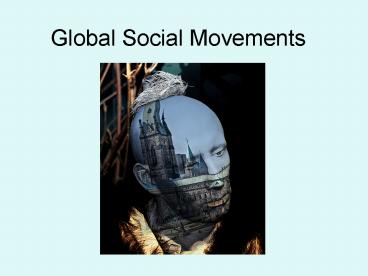Global Social Movements - PowerPoint PPT Presentation
1 / 25
Title:
Global Social Movements
Description:
... as a way of life or religion? (iii) Exclusion of nature/ environmentalism ... (ii) Aboriginal stolen generation' (iii) Foucault on the disciplinary' society ... – PowerPoint PPT presentation
Number of Views:27
Avg rating:3.0/5.0
Title: Global Social Movements
1
Global Social Movements
2
Week 4. New Social Movements Challenging the
Boundaries of Liberal Democracy.
3
Outline
- I. New Social Movements A Surprising
Development? - II. Welfare State Capitalism The Calm Before
the Storm? - III. Political Opposition of 1950s 1960s
- IV. Contradictions of the Welfare State
- V. Claus Offe on the New Politics
4
I. New Social Movements A Surprising
Development?
5
- 1. New social movements (NSMs) as successors
to New Left and other opposition movements of the
1960s. - 2. Need to understand society in which NSMs
emerged at least thats new! - 3. Weve seen role of old social movements in
creating that society.
6
4. Dimensions of newness of NSMs
- (i) aims or object of politics
- (ii) agents, actors, identities or subjects of
politics - (iii) forms of political practice and
organisation - (iv) ideas, ideology and theory
7
II. Welfare State Capitalism The Calm Before
the Storm?
8
- 1. Self-understanding of Western societies in
1950s and 60s - (i) stability and apathy
- (ii) pluralist, democratic and free
- (iii) absence of class struggle
- (iv) affluence and consumerism
- (v) youth culture sex, drugs and rock n roll
9
- 2. Post-WWII social democratic consensus
- (i) mixed economy capitalism nationalisation
- (ii) Keynesian economics
- (iii) full employment
- (iv) welfare and social security
- 3. Consensus on foreign policy
- (i) nuclear strategy under US leadership
- (ii) Cold War anti-communism
- (iii) McCarthyite witch-hunts against communists
- (iv) Menzies against the communists and the DLP
10
4. Limited party-political disagreements over
- (i) degree of progressive taxation
- (ii) extent of welfare state
- (iii) trade union rights vs. rights of private
property - (iv) extent of nationalisation vs. private
enterprise
11
III. Political Opposition 1950s-1960s
12
- 1. Campaign for Nuclear Disarmament and peace
movement - (i) middle-class radicalism (F. Parkin)
- (ii) moral protest
- (iii) active non-violence influence of Gandhi
13
2. Black Civil Rights Movement in USA from
1950s
- (i) for civil and political rights of African
Americans - (ii) peaceful civil disobedience (Martin Luther
King) - (iii) Black Power, Malcolm X and the politics of
identity - (iv) transition to violence
14
3. Anti-colonial struggles
- (i) wind of change (Macmillan) blowing through
Africa anti-colonialism - (ii) Frances last-ditch colonialism the War in
Algeria - (iii) Vietnam War France, USA and Australia
15
4. Opposition to the Vietnam War and the
Counter-Culture
- (i) student radicalism
- (ii) New Left
- (iii) The counter-culture of alternative values
and life-styles - (iv) Hippies, Woodstock, Nimbin
- (v) Sex and Drugs and Rock n Roll.
16
IV. Contradictions of the Welfare State
17
1. Management of social conflict of labour vs.
capital
- (i) Class compromise of welfare state
- (ii) Working class as subordinate partner to
capital - (iii) Institutionalisation of working class
social movement - (iv) Social Democratic and Labour parties and
Trade Unions - (v) Neo-Corporatism government, labour and
capital
18
2. Limited Democracy of Welfare State
- (i) Exclusion of constituencies other than Labour
and Capital - (ii) Exclusion of interests and issues
- (iii) Examples of women, GLQ, ethnic groups etc.
19
3. Unquestioned assumptions of welfare state
- (i) Economic Growth dubious measure of GDP
- (ii) Consumerism as a way of life or religion?
- (iii) Exclusion of nature/ environmentalism
20
4. Bureaucratic regulation of everyday life as a
form of social control
- (i) Paternalism of Welfare State
- (ii) Aboriginal stolen generation
- (iii) Foucault on the disciplinary society
21
V. Claus Offe on the New Politics
- 1. New Right/ Neoliberal critique of welfare
state - (i) Failure of Keynesian economics
- (ii) Impending fiscal crisis of the state
(Huntington) - (iii) Erosion of traditional values family,
work ethic and self-reliance
22
- 2. New Right or neo-liberal proposals
- (i) Free market and deregulation
- (ii) Minimal state
- (iii) Neoliberal globalisation
- 3. Old Left defence of welfare state/ social
democracy. - (i) Problem of globalisation
- (ii) Social democracy in one country?
23
4. Solution of NSMs
- (i) against both state and capital
- (ii) issues of consumer, client or citizen
rather than worker - (iii) responding to the problems of modernisation
24
5. Possible alliances between three ideological
tendencies
- A. Right Old Left conservative defense of
welfare state model - B. Right New Social Movements
- C. New Left New Social Movements (e.g. Greens)
25
Summary
- I. New Social Movements A Surprising
Development? - II. Welfare State Capitalism The Calm Before
the Storm? - III. Political Opposition of 1950s 1960s
- IV. Contradictions of the Welfare State
- V. Claus Offe on the New Politics































